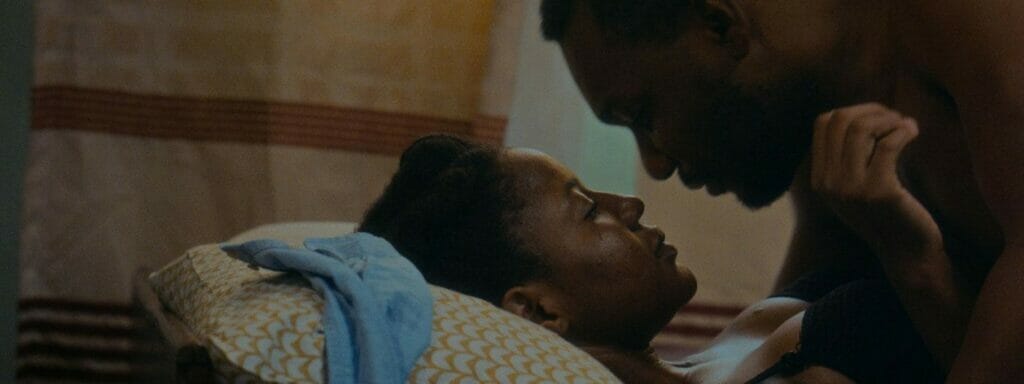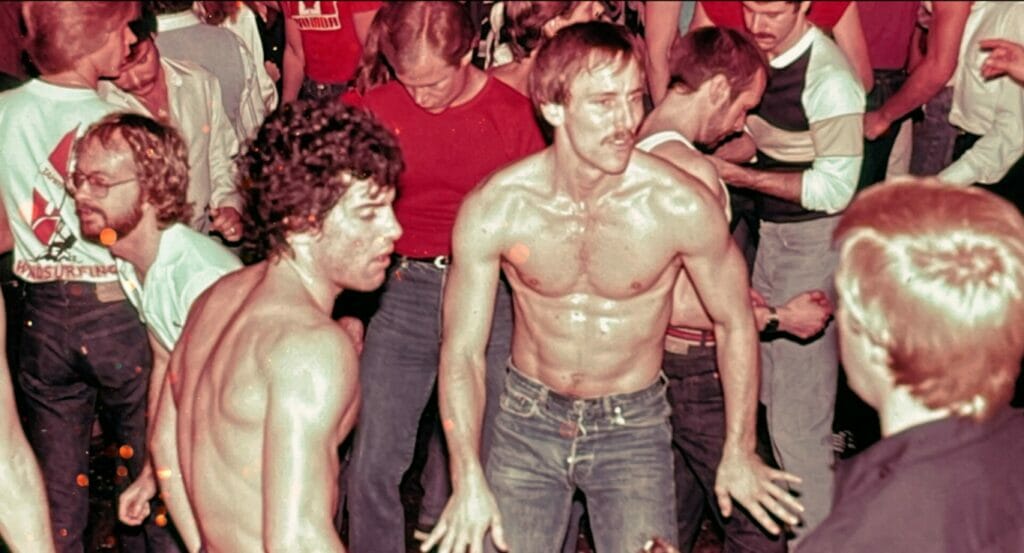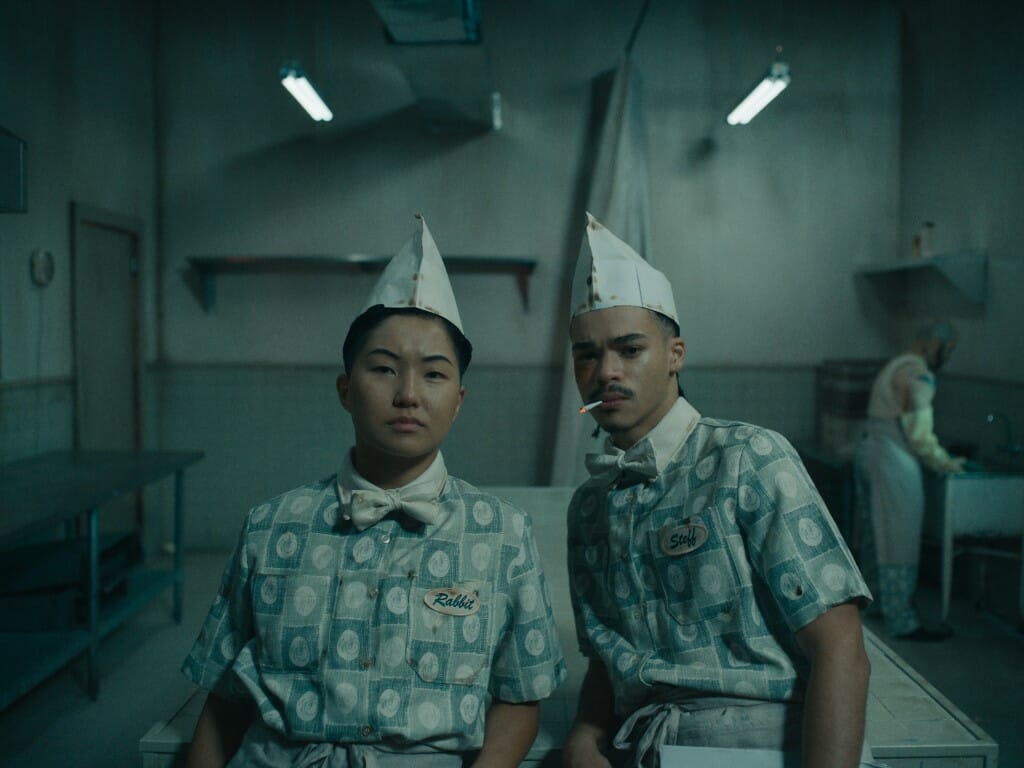Chicago’s preeminent queer film festival emphasizes the importance of queer spaces, in both enlightening documentaries and evocative shorts.
This piece was written during the 2023 SAG-AFTRA strike. Without the labor of the actors currently on strike, the works being covered here wouldn’t exist.
A place to gather is vital for the formation of any community. Even in the digital age, in which most community spaces begin or remain online, the pandemic has certainly reaffirmed the importance of having a place where folks can be seen and see others living their lives. Place is something we share in common, as quite a few films from this year’s Reeling, Chicago’s preeminent LGBTQ+ film festival, demonstrate.
Rodrigo Carvalhedo’s endearing short film Wishful Thinking shows the agony and necessity of being split by distance. On the eve of his birthday, Rodrigo (Carvalhedo, playing a version of himself) gets a birthday call from his family, who live in a conservative town in Brazil. Little do they know that his partner, Chris (Christian Kolb), is hidden from the camera in the other room. But when Rodrigo blows out the candle, the distance collapses. Suddenly, his parents appear, and the panic starts all over.
With the next candle, he’s transported to Brazil with Chris, just about to come out to his family. The chaotic back-and-forth reveals the cultural specifics of each place, allowing Rodrigo to “rehearse” his anxiety, work through it, and grow more courageous in his truth. A happy ending can only come when queer people feel seen and safe amongst both people and places.

All The Colours Of The World Are Between Black and White opens with city noise. As director Babatunde Apalowo acclimates us to the urban traffic of Lagos, Nigeria, he introduces us to its everyday chaos teeming with life, commerce, and scrutiny. Bambino (Tope Tedela) watches from a safe distance as the scrutiny grows into harassment and violence. Bambino becomes a bystander, shrinking themselves to avoid becoming a target.
Thanks to the depth and quietude of Tedela’s performance, we sense Bambino has unspoken parts of himself he’d rather not let people know about. Not while it’s still highly criminal to be queer in his country. Poignantly photographed by David Wyte, All The Colours celebrates the power of its locale, filling it with a Romantic longing for Bambino’s life to be as vibrant and textured as his hometown.
When Bawa (Riyo David) enters his life, the wall Bambino has set between his desires threatens to block his chance at fulfillment. Apalowo’s graceful and aching staging electrifies the gulfs he leaves between characters. They become vacuums of things unexpressed, voids that the audience can fill with their hopes and fears. Apalowo has written a story that isn’t about migration or escape but about the resilience of staying, minding the gap, and continuing to live amid struggle. Though it comes at great expense to our characters, survival nourishes a strength that rejoins the self and frees Bambino to bear his soul.
Pride in one’s place, despite that place’s hatred for you, is a theme underscored in a few of the brilliant shorts featured this year. But a couple feel particularly parallel to what Apalowo sets down in his exquisite debut feature. Take Mehdi Koushki and Melina Kian’s evocative short film, Excess, which poses a thought experiment on how queerness disturbs patriarchal law. Set in the Islamic Republic of Iran, two sisters meet with the judge after their father’s passing to decide the fate of his estate. But when their long-absent third sibling arrives, having had his gender-affirming surgery, the court is unsure if he can receive the larger share of the property, which can only be passed on to “males.”
Koushki and Kian’s film uses the microcosm of a will reading to demonstrate how being a transman profoundly confuses Iranian legality and society, which are structured to support men. Though their sibling was away for a while, their return signals a commitment to the struggle and changing their culture.
The same is undoubtedly true in Ambrosia, the moving biographical short about the titular legendary Alabama drag queen, directed by Isabella Mille and Gabe Braden. Though a visible force in local politics, Ambrosia has to keep her identity a secret because of the constant threats against her. Like Bambino, Ambrosia lives amongst intense social security. Yet Mille and Braden allow her to boldly proclaim a more inclusive future, which can only grow from the local.

That future begins in a space where people can imagine it, as Marc Satarelli passionately asserts in his documentary Studio One Forever, about the first gay disco in The United States. In 2018, when the film begins, the imposing building stands abandoned amongst the nightlife of West Hollywood, California. With the fate of the space in jeopardy, ex-employees and patrons return for one last dance with old ghosts.
The resulting waltz down memory lane is filled with poignant memories of lives and loves won or lost. The history of Studio One charts a critical period in Queer History, opening at the dawn of the Gay Liberation Movement and shuttering at the heights of the AIDS crisis, and contains all the joys and troubles in between. Satarelli tactfully allows the space to be a flawed escape, confronting the drug abuse that went on and the racist and classist dress codes that prevented Studio One from being welcome to all.
With delightful talking head interviews from some of the legends that walked its corridors and performed at its infamous Backlot music venue, Studio One Forever is a frank oral history that shows just how much Queer America has matured since the heyday of this safe space (for some).
Documentaries like this and Drew de Pinto’s short, Last Call, about three San Francisco clubs that shuttered during the pandemic, are elegiac witnesses to a closing chapter of queer life. While bars and clubs will always be a part of the queer community, the Coronavirus pandemic and ongoing reevaluation of alcohol’s role in queer society mean they may never return to their former glory.
Now’s probably a good time to explore this, because there are alternatives like Hillside Campgrounds in Northern Pennsylvania, explored in Austin Lee Bunn’s poignant hybrid doc Campfire, about a late-in-life awakening, where queers can meet and explore nature, themselves, and each other. This, along with Studio One Forever and Last Call, are passionate reminders that queer people need safe spaces in which people can close the distance between themselves and their desires and meet other people looking to do the same.

Such important memories stick to a place and leave residues behind. Georden West’s haunting film Playland explores the residues of The Playland Cafe in Boston, Massachusetts, which was a queer refuge from 1937 to 1998. This superb film awakens the ghosts of patrons and employees from throughout the space’s history, told through a series of inter-gliding vignettes. West’s singular vision collapses space, place, time, and selves to tell a dynamic story of queer life in all its guts and glory. Any film that has Lady Bunny lipsync to opera with total sincerity has to be my pick for the best of the festival.
More than that, Playland needs to be seen for its fresh vision, hauntingly beautiful visions, and palpably queer intent. West leans into anachronism as a queer mode of being, slipping into a dreamy and queer metaphysics in which all time and media can exist simultaneously.
Watching these films together, one gets the sense that queer society is in a state of mournful uncertainty. Many spaces that were once safe have shuttered, and queerness is being further criminalized around the globe. While the criminality or closing of places and borders may make it harder for queer people to find each other and express themselves, these films offer resounding hope that new spaces will sprout. After all, they always have.
Other Coverage of Previous Reeling Fests:
Read next: The Spool's Best New Releases
Streaming guides
The Best Live TV Streaming Services With Free Trial
The praises of live TV streaming services don’t need to be further sung. By now, we all know that compared to clunky, commitment-heavy cable, live TV is cheaper and much easier to manage. But just in case you’re still on the fence about jumping over to the other side, or if you’re just unhappy with ... The Best Live TV Streaming Services With Free Trial
How to Watch Power Book III: Raising Kanan Season 3
Season 3 of the hotly anticipated Power spin-off, Power Book III: Raising Kanan, is arriving on Starz soon, so you know what that means: it’s the ’90s again in The Southside, and we’re back with the Thomas family as they navigate the ins and outs of the criminal underworld they’re helping build. Mekai Curtis is ... How to Watch Power Book III: Raising Kanan Season 3
How to Watch Doctor Who: 60th Anniversary Specials
Ladies and gentlemen, we’re so back! To celebrate Doctor Who’s 60th anniversary, the BBC is producing a three-episode special starring none other than the Tenth/Fourteenth Doctor himself, David Tennant. And to the supreme delight of fans (that would be me, dear reader), the Doctor will be joined by old-time companion Donna Noble (Catherine Tate) and ... How to Watch Doctor Who: 60th Anniversary Specials
Which Netflix Country has Interstellar?
Maybe you’ve just seen Oppenheimer and have the strongest urge to marathon—or more fun yet, rank!—all of Christopher Nolan’s films. Or maybe you’re one of the few who haven’t seen Interstellar yet. If you are, then you should change that immediately; the dystopian epic is one of Nolan’s best, and with that incredible twist in ... Which Netflix Country has Interstellar?
Which Netflix Country Has Each Movie of The Hunger Games?
For whatever reason, The Hunger Games series isn’t available in the same countries around the world. You’ll find the first and second (aka the best) installments in Hong Kong, for instance, but not the third and fourth. It’s a frustrating dilemma, especially if you don’t even have a single entry in your region, which is ... Which Netflix Country Has Each Movie of The Hunger Games?
How to Watch ESPN With A Free Trial
One of the major concerns people have before cutting the cord is potentially losing access to live sports. But the great thing about live TV streaming services is that you never lose that access. Minus the contracts and complications of cable, these streaming services connect you to a host of live channels, including ESPN. So ... How to Watch ESPN With A Free Trial
How to Watch Paramount Network With a Free Trial
To date, Paramount Network has only two original shows on air right now: Yellowstone and Bar Rescue. The network seems to have its hands full with on-demand streaming service Paramount+, which is constantly stacked with a fresh supply of new shows. But Yellowstone and Bar Rescue are so sturdy and expansive that the network doesn’t ... How to Watch Paramount Network With a Free Trial
How to Watch WE TV With a Free Trial
Previously “Women’s Entertainment,” We TV has since rebranded to accurately reflect its name and be a more inclusive lifestyle channel. It’s home to addictive reality gems like Bold and Bougie, Bridezillas, Marriage Boot Camp, and The Untold Stories of Hip Hop. And when it’s not airing original titles, it has on syndicated shows like 9-1-1, ... How to Watch WE TV With a Free Trial
How to Watch TNT Sports With A Free Trial
For many sports fans, TNT is a non-negotiable. It broadcasts NBA, MLB, NHL, college basketball, and All Elite Wrestling matches. And, as a bonus, it also has reruns of shows like Supernatural, Charmed, and NCIS, as well as films like The Avengers, Dune, and Justice League. But while TNT used to be a cable staple, ... How to Watch TNT Sports With A Free Trial
How to Watch Comedy Central With a Free Trial
It’s no coincidence that many of today’s biggest comedians found their footing on Comedy Central: the channel is a bastion of emerging comic talents. It served as a playground for people like Nathan Fielder (Fielder For You), Ilana Glazer and Abbi Jacobson (Broad City), Tim Robinson (Detroiters), and Dave Chappelle (Chappelle’s Show) before they shot ... How to Watch Comedy Central With a Free Trial
How to Watch FX With a Free Trial
You’d be hard-pressed to find a bad show airing on FX. The channel has made a name for itself as a bastion of high-brow TV, along with HBO and AMC. It’s produced shows like Atlanta, Fargo, The Americans, Archer, and more recently, Shogun. But because it’s owned by Disney, it still airs several blockbusters in ... How to Watch FX With a Free Trial